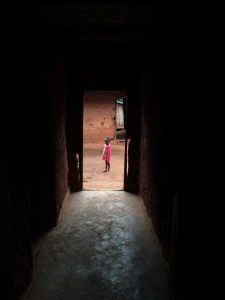Whose Lives Matter? Race, Gender and Childhood in (Post-)Humanitarian Campaigning at Global and Local Levels- A Case Study of #BringBackOurGirls.
Dr Stacey Hynd (History), Dr Elena Gadjanova (Politics), Dr Lewys Brace (Sociology, Philosophy & Anthropology), with Dr Sefina Dogo Aliyu (Politics & Anthropology).
“Whose Lives Matter? Race, Gender and Childhood in (Post-)Humanitarian Campaigning at Global and Local Levels” is an interdisciplinary interrogation of virality and digital humanitarianism, through a case study of the “#Bring Back Our Girls phenomenon”, combining approaches from History, Ethnography, Sociology, and Political Science.
 An Introduction to the Project…
An Introduction to the Project…
“On 14-15 April 2014, 276 teenage schoolgirls were kidnapped from their school by the militant Islamic group Boko Haram. In response to the abductions and the Nigerian government’s slow response, protests began in several Nigerian cities. The hashtag #BringBackOurGirls began trending among Nigerian Twitter users, before being appropriated by Western feminists. By late April 2014, ‘#BringBackOurGirls’ [#BBOG] had become a global phenomenon, with over one million tweets bearing that hashtag, the campaign buoyed by US First Lady Michelle Obama and schoolgirl activist Malala Yousafzai’s tweets in support. Yet whilst millions tweeted their support for the ‘Chibok Girls’, there was no similar outcry over abducted Nigerian boys, Yazidi girls sold into sexual slavery by ISIS, or displaced/migrant children in Latin America.
Why does the international community and global civil society care about some children, whilst the suffering of others goes unremarked? What is the political, cultural and emotional calculus of concern that determined which children are adjudged befitting of rescue? How and why do some humanitarian advocacy campaigns succeed in generating global or transnational concern, particularly in this social media age? And does concern and outrage among transnational civil society in turn translate into effective intervention?
This interdisciplinary project seeks to answer the questions above by combining approaches from History, Ethnography, Sociology, and Political Science to study the #BBOG phenomenon. Significantly, the project interrogates the tensions and contrasts between the viral phenomenon of #BBOG internationally and the sustained political activism and local advocacy of #BBOG Nigeria.
Firstly, the project undertakes qualitative analysis of published and grey literature, and archival sources, to identify key humanitarian, human rights and developmental frames. It establishes an historical genealogy of child-saving (and girl-saving) in Africa, locating the #BBOG phenomenon within histories of humanitarian, human rights and developmental interventions from c.1935 to the present, showing how contemporary campaigns are shaped by racialized (post-)colonial legacies and tensions between local and global norms of girlhood. Second, the project undertakes in-depth analysis of the #BBOG social media campaign, data scraping from Twitter, Facebook and Instagram using hashtag searches. It interrogates what frames, tropes, and images become viral in the context of humanitarian interventions and why, and examine how structural and positional power determine which actors have oversized social media influence in the digital age. Using framing methodology, it will produce a conceptual vocabulary of influential social media frames that generate issue salience and promote powerful emotions responses among a global audience. Third, the project will undertake ethnographic interviews in Nigeria with #BBOG and other advocacy groups, military personnel, local journalists and faith groups. These interviews will unpack the intersections of race, gender, age and religious identification in shaping local responses to the Chibok abductions, highlighting how local understandings and advocacy tactics differed from the international #BBOG campaigns
As youth are the prime target of digital humanitarianism, our student interns form an invaluable part of our research team, informing the project’s development and analysis: Tomi Adesina (Creative Writing), Ruslan Kudryashov (Politics), Nicole Mwanashiku (Conflict Studies), Anda Solea (Psychology).”
– Hynd et al.
